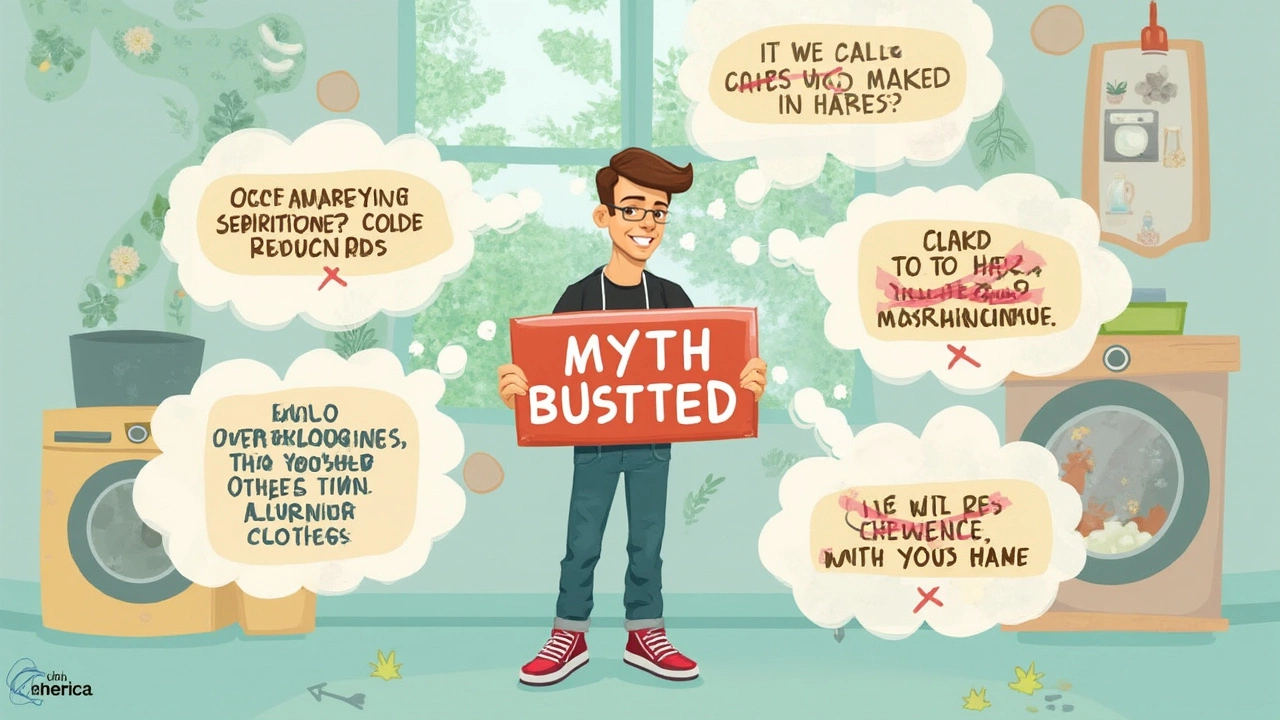Ever bought a “brand new” washing machine and felt like it died way too soon? You’re not alone. Most modern washers last about 8 to 12 years, if you’re lucky. That’s not what our parents saw. My own first washer barely limped past its tenth birthday before making sounds like Luna messing with the pots and pans.
Here’s something wild: some of the really old-school washers from the 1980s and ’90s? Still chugging along in basements and laundry rooms today. Why does that happen? And is there any way to get your newer, shinier machine to go the distance?
If your washer starts rattling, leaking, or leaving clothes damp, you might wonder if you should scrap it or try to fix it. Truth is, a bit of know-how and a few simple habits can sometimes buy you years. But sometimes, you just have to let go and start hunting for a new deal.
- How Many Years Can You Really Expect?
- What Makes Some Washers Last Longer?
- Do Brands and Price Matter?
- Easy Habits that Keep Washers Alive
- When to Repair and When to Replace
How Many Years Can You Really Expect?
So, what’s the real-life average for a washing machine lifespan? Right now, most new washers tap out between 8 and 12 years. Some brands brag about making it to 15, but for most families running two to five loads a week, 10 years is a fair bet. High-efficiency front loaders tend to land at the lower end of the range because they’re packed with more moving parts and electronics that can go wrong.
If you’re the type who buys used, those numbers drop even lower. Worn-out bearings, leaky drums, or electrical issues can show up much faster with pre-owned machines, sometimes within just a couple of years.
Take a look at these numbers from a recent 2024 survey of appliance repair pros and manufacturers. Here’s what you can expect for the average machine, with normal use:
| Type | Average Lifespan (Years) | Notes |
|---|---|---|
| Top-Loading Washer | 10–14 | Less fancy tech, easier fixes |
| Front-Loading Washer | 8–12 | Uses less water, more prone to mold and electronics fizzles |
| Commercial-Grade Washer | 15–20 | Bigger, pricier, built to survive tons of cycles |
Your washer’s lifespan depends a lot on load size and how often you run it. Households with kids or lots of sports uniforms can rack up those cycles fast, and that wears out even the best machines quicker. Machines living in apartments, sometimes shared, usually give up sooner due to heavy constant use.
If you’re aiming to get the most out of your washer, keep an eye out for early warning signs: strange noises, longer wash times, or small water leaks. Sometimes these small problems spiral into big repairs if you ignore them. Up next, let’s figure out what makes some washers stick around longer than others.
What Makes Some Washers Last Longer?
Ever noticed how your neighbor’s washer sticks around forever, but yours conks out after a few years? A few key things pretty much decide whether your washing machine will keep going—or cry uncle early.
Here’s what actually matters:
- Build Quality: Machines with metal parts (like drums and bearings) outlast plastic-heavy ones. Top loaders tend to have sturdier builds than budget front loaders.
- How Often You Use It: More loads per week equals more wear and tear. Someone with a big family who does daily loads will go through a washer way faster than a single person running it twice a week.
- Type and Size: Commercial washers and higher-end home models almost always beat out super cheap appliances. Bigger isn’t always better either—overloading the drum shortens the machine’s lifespan.
- Maintenance: Simple habits—like cleaning the filter once a month, checking for leaks, and using the right amount of detergent—make a big difference.
Let’s look at how different washer types compare. Check out the average years you can expect before repairs or replacement:
| Type of Washer | Average Lifespan (years) |
|---|---|
| Top Loader (with agitator) | 10–14 |
| Top Loader (no agitator) | 8–12 |
| Front Loader | 8–10 |
| Commercial/Heavy Duty | 15–20 |
Don’t forget: skipping the manual’s care tips, overloading, or ignoring small problems (like weird noises) usually cuts those numbers down fast. Treat your washer well and you squeeze out the full lifespan—or even a little extra.
If you want to really boost your washing machine lifespan, it’s those small, regular habits that count. Ignore them, and you’ll be shopping for a new washer sooner than you’d like.

Do Brands and Price Matter?
Here's something a lot of folks chew over at the store: is shelling out for a fancier brand really worth it? You’d think pricier washers would last the longest, but the answer isn’t as simple as just checking the price tag or label.
Let’s talk stats. According to real-world surveys from Consumer Reports and appliance repair techs, these are the average lifespans for some of the big washing machine brands right now:
| Brand | Average Lifespan (Years) | Typical Warranty (Years) |
|---|---|---|
| LG | 10-12 | 1 |
| Whirlpool | 10-14 | 1 |
| Samsung | 9-12 | 1 |
| GE | 8-12 | 1 |
| Maytag | 10-14 | 1 |
| Speed Queen | 15-25 | 3-5 |
| Bosch | 10-12 | 2 |
Price sometimes lines up with longevity but not always. For example, Speed Queen costs more and is basically the gold standard for *washing machine lifespan*, lasting almost double the years of bargain brands. But spendy doesn’t always mean tougher. Some luxury European machines cram in so many electronics that repairs get complicated and costly.
Here’s what helps when you’re shopping or comparing washing machines:
- Buy from brands with strong reliability reports, not just a flashy name.
- Check for warranties longer than a year, especially on motor or drum.
- Don’t ignore user reviews—look for mentions of weird breakdowns or how customer support handles issues.
- Ask repair techs which brands they see in their shop the least, and avoid models that require pricey, hard-to-find parts.
Spend enough for a quality brand with fewer plastic parts and a good history, but don’t assume a massive price tag will guarantee 20 years of use. The little details—build quality, warranty, and after-sale support—often matter way more.
Easy Habits that Keep Washers Alive
You don’t need to be an appliance tech to squeeze extra years out of your washing machine. A few habits make all the difference—and you’d be shocked how many people skip them. Let’s talk about the easy stuff that really works.
- Washing machine lifespan jumps up if you don’t overload it. If you’re shoving in that last sweater and cramming the door, your motor and bearings are paying the price. Most manuals suggest to fill about three-quarters full—leave some air for clothes to move.
- Wipe down that rubber door seal after every wash, especially if you have a front-loader. It gets gunky fast, and that gunk leads to mold and bad smells. Just a quick towel swipe is enough.
- Run an empty hot cycle with a cup of white vinegar every month. This clears out detergent buildup inside and helps kill bacteria. My grandma’s washer is going strong at 18 years, and she never misses this step.
- Leave the washer door open for at least an hour after each load. Moisture trapped inside breeds mold, especially in humid spots like a basement.
- Check and clean the drain pump filter every few months. You’d be amazed at the junk people find—coins, hair clips, socks.
Here’s how much work and money these simple steps can save you:
| Action | Time per Month | Typical Repair Cost Saved |
|---|---|---|
| Clean seal & leave door open | 1 hour | $120–$250 (mold/mildew removal) |
| Monthly vinegar wash | 20 min | $80–$200 (buildup removal or odor fixes) |
| Filter cleanout | 15 min | $90–$220 (pump issues) |
| Not overloading | No extra time | $150–$400 (drive or bearing repair) |
Follow this stuff regularly and your washer’s odds of making it past 10 years just got way better. Also, use the right type and amount of detergent. High-efficiency (HE) washers need HE detergent—regular soap creates too many suds and can jam stuff up. Your machine isn’t just being picky, it’s built for these rules.

When to Repair and When to Replace
If your washer is misbehaving, it’s tempting to jump right to a new one. But it’s usually smarter to pause and check if a quick fix could save you hundreds. Here’s a rule that appliance techs use: if the repair costs less than half the price of a new machine—and your washer isn’t ancient—it’s often worth repairing. Once the numbers go over 50% of the price of a new model, especially on older washers, it’s time to move on.
Age matters. The average washing machine lifespan is about 10 years. If yours has already hit double digits, repairs rarely make sense. Major issues like a broken drum, bad transmission, or failing motor on a machine that’s 8 years or older? That’s usually a sign it’s on borrowed time. But little stuff like stuck door latches, clogged drain filters, or faulty valves can sometimes be fixed for the price of a family pizza night.
- Repair if: It’s a simple issue (like a clog, hose, or belt) and your washer is under 8 years old.
- Replace if: Your machine is leaking from the tub, the drum doesn’t spin, or it’s constantly breaking down after 8-10 years.
- If you have a fancy smart washer, check the warranty. Loads of newer models cover certain failures for years—even if the rest of the machine is aging.
Also, think about that energy bill. Older models can swallow more power and water than new ones. If your monthly utility costs keep climbing, that’s a hint the washer might be costing you more in the long run.
If you’re still not sure, ask a pro for a diagnosis. Most shops will quote before the repair. Don’t feel pressured by sales pitches—there’s real value in squeezing a few more years from your machine if you can keep it running well.
